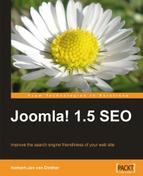There are several other options build into the SEF patch, which you can use to guide the search engines and tell them what to do with your pages.
In the previous chapter, you also read about the robots.txt file. With this patch you get control over spiders and indexing on the page level.
The Robots meta tag is there to guide the Search Engine Robots to navigate through your site, telling them they should index the pages.
In the standard Joomla! Robots meta tag you have to write the terms yourself. However, with the patch you can use the drop-down box, which should make it easier for you to quickly change the settings.

If you don't specify that you want to use this field, it is not shown and the robots will use their default, which is index, follow.
So your pages will be indexed and the links on the page will be followed.
For pages such as privacy statements, disclaimers, and site rules you can use the noindex, nofollow option, as you don't really want them in the search engine results.
Links to these pages will be shown on every page of your site. However, they are not as important as the link to your home page, so take them out of the index with the noindex, nofollow option.
The new field Google settings give you more control over how Google handles your article pages.

My suggestion is to leave them set to the standard option, Do nothing. The only cases where you should use these options are when you find that you are wrongly affected by the Open Directory Project (ODP) description for your site (noodp), or if your have some copyright concerns about a specific page (noarchive). For example, if the description of your link on dmoz.org web site would conflict with the actual content of your site, then you should use the noodp option. If you have copyrighted content that you don't want to show up in the cache function that Google provides; for example, an article that should only be visible to logged in users you use the noarchive function.
In some special cases, where you want to change the way search engines handle your pages, you should use these fields in the way they are intended:
- noarchive: This means that you don't want Google to cache the page's content on its servers. Mostly this is done for content that you want to get indexed, but is changed frequently. With this option set, Google will not show a previous version from its own servers.
- nosnippet: This tells Google that it should not create and use its own summary, or any other summary to display in the result pages.
- noodp: This one is used because you have no control on how the ODP (http://www.dmoz.org/) editors will describe your web site in their directory. This description was used by Google and other search engines, but now it is less important than it was some years ago. You can use this option to tell the search engines not to use the description that is given to your site if it is added to the ODP
The other options in the drop-down box are combinations of the options we have just covered. If you want to use these options, make sure you understand the effects they might have on your rankings.
